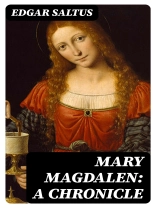Edgar Saltus’s ‘Mary Magdalen: A Chronicle’ is a captivating historical fiction novel that delves into the life of Mary Magdalen, exploring the religious and personal struggles she faced. The book is written in a lush and descriptive prose style, immersing the reader in the ancient world of biblical times. Saltus skillfully weaves together historical facts with imaginative storytelling, creating a vivid portrayal of one of the most enigmatic figures in Christian history. The novel offers a unique perspective on Mary Magdalen, shedding light on her humanity and complexity as a character. This literary work is sure to engage readers interested in historical fiction and religious narratives, offering a fresh interpretation of a well-known biblical figure. Edgar Saltus, known for his decadent and sensuous writing style, brings his signature flair to ‘Mary Magdalen: A Chronicle’. His background in literature and philosophy likely inspired him to delve into the historical and religious themes present in the book. Saltus’s attention to detail and ability to evoke a sense of time and place make the novel a compelling read for those intrigued by the intersection of faith and storytelling. For readers seeking a thought-provoking and immersive literary experience, ‘Mary Magdalen: A Chronicle’ by Edgar Saltus is a must-read. Saltus’s masterful storytelling and portrayal of a complex biblical figure make this novel a standout in the genre of historical fiction, appealing to both fans of religious literature and those seeking a gripping narrative.
Sobre o autor
Edgar Saltus, an American writer celebrated for his highly polished prose and transcendental forays into psychological fiction, was a prominent figure in the early literary circles of the late 19th and early 20th centuries. Born on October 8, 1855, in New York City, Saltus emanated from a lineage of scholars and attorneys; his refined education at Columbia College Law School indeed influenced his erudite narrative style. Despite his law background, Saltus’s passion remained firmly rooted in literature, where he found a penchant for exploring themes of decadence, aestheticism, and the intricacies of human nature.
His works, which include the notable title ‘Mary Magdalen: A Chronicle, ‘ exemplify his interest in historical and biblical figures, through which he offered nuanced perspectives on morality and spirituality. This book, like many of his others, displays Saltus’s discerning penchant for detail and his ability to infuse fictional storytelling with philosophic inquiry. His narrative voice, often characterized by its opulent verbosity and lyrical quality, garnered a dedicated if not vast audience; his literary style is frequently compared to that of Oscar Wilde, whom Saltus admired.
Though never achieving the household recognition of his contemporaries, Saltus’s contribution to American literature persists in academic discussions of pre-modernist authors, and his oeuvre remains a testament to the aesthetic and intellectual concerns of his age. He passed away on July 31, 1921, but his legacy continues to intrigue scholars who seek to untangle the complexities of late 19th-century literature.












